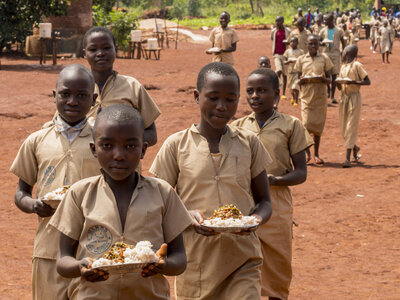Burundi
- 1.9 million-plus
- people at crisis levels of food insecurity
- 53%
- of children under 5 are stunted
- 13.6 million
- population
Burundi is a landlocked and densely populated country facing a myriad of socioeconomic hurdles. Over 70 percent of the population struggle to make ends meet and nearly 56 percent of children under 5 suffer from stunting (impaired growth due to malnutrition).
Food security is fragile due to a combination of factors, with over 1.9 million people at crisis levels according to the Integrated Food Security Phase Classification.
Burundi has received the largest number of refugees fleeing violence and insecurity in eastern Democratic Republic of the Congo, with 70,000 arriving since mid-February 2025. The World Food Programme (WFP) has doubled the number of refugees it is supporting to ensure desperate new arrivals have food. However, this is stretching humanitarian resources to the limit.
Recurring weather extremes lead to massive internal displacements and damage the livelihoods of a rural population that is highly dependent on subsistence farming for its food security.
Economic challenges loom large, with the local currency continuously depreciating, inflation soaring and fuel shortages driving up the prices of essential food items.
WFP and partners supporting the government by providing humanitarian food assistance to the most vulnerable people and through resilience-building initiatives. WFP and the Government of Burundi are working to build a national home-grown school feeding programme that reaches all elementary schoolchildren by 2032.
What the World Food Programme is doing in Burundi
-
Refugee crisis response
-
WFP provides food and cash-based assistance to 120,000 refugees and asylum seekers. Since January 2025, an influx of Congolese refugees fleeing violence in eastern Democratic Republic of the Congo has put immense pressure on WFP’s response capacity. Due to funding shortfalls, daily rations have been reduced from 75 percent to 50 percent of the recommended daily calorie intake.
-
Food systems and livelihoods
-
School meals
-
Social protection
-
Logistics services
Burundi news releases
Go to pagePartners and donors
Find out more about the state of food security in Burundi
Visit the food security analysis pageOperations in Burundi
Contacts
Office
Avenue du Large 78, Immeuble CEPRODILIC B.P. 6735
Bujumbura
Burundi







